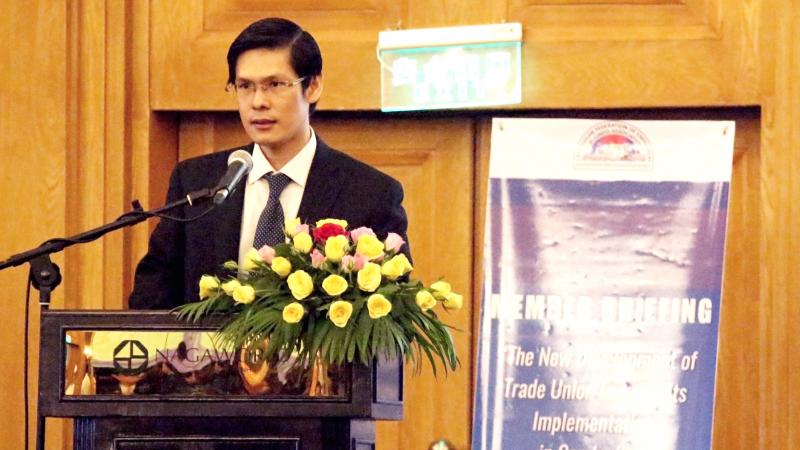New Trade Union Law: Implications for Businesses in Cambodia
The new Trade Union Law, effective in May 2016, will present both new risks and opportunities to businesses in Cambodia. At the briefing event at Naga World on 29 June 2016, SXH Managing Director Mr. Sok Lor delivered a briefing on the new Trade Union Law to approximately 100 members of the Cambodian Federation of Employers and Business Associations (CAMFEBA).
During the briefing, Mr. Sok discussed the procedure for registration of trade unions, qualifications of trade union leaders, duties of good faith of employers and trade unions, among other provisions. Further, the briefing centered on the effects of the new collective bargaining regime for businesses.
Mr. Sok mentioned that in the short term, businesses – particularly those with labor intensity – could see an increase in industrial relations disruptions. The new Trade Union Law, in its Article 54, has reduced the threshold for a union to obtain ‘most representative status’ – authority to compel employers to the bargaining table – from a minimum of 30% of total workers in an enterprise, from the previous level of more than 50% of workers.
The greater ease for ‘most representative status’ is likely to engender higher risks for businesses in the short term. The Cambodian industrial relations environment is likely to experience a rise in competition among the trade unions to secure the status toward assuming an exclusive legal position as the authoritative trade union to engage with the employers in collective bargaining.
If the number of unions that can achieve the ‘most representative status’ rises, Cambodian industrial relations environment may also see a jump in the ‘collective bargaining agreements’ – currently standing at below 5% of enterprises in Cambodia.
However, Mr. Sok cited the experiences of advanced countries like Australia, Sweden, United Kingdom, and the United States and highlighted that in the medium and long term, Cambodian industrial relations environment could experience greater stability and harmony if the volume of collective bargaining agreements increases as the agreements represent greater mutual trust and self-regulations of employers and trade unions.
On management of the short-term risks, Mr. Sok recommended that enterprises strengthen their internal workplace management, system and tools; maintain engagement with trade unions strategically; monitor the development of collective bargaining; and seek professional support from industrial relations experts and lawyers where necessary.


